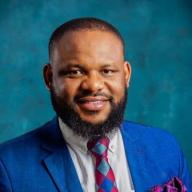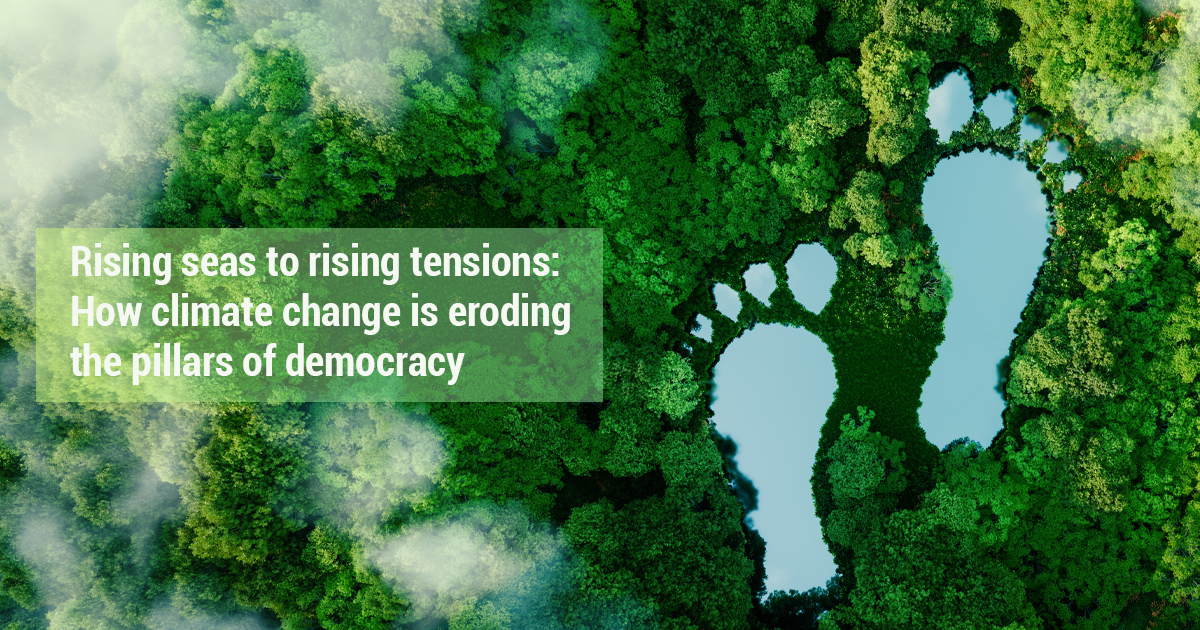by Seun Bakare
The year 2024 has been tagged as the global year of elections. Seun Bakare, the Executive Director of Climate Peace Alliance, and HRDA Alumni, (Class of 2014) explores how climate change impacts and risks are undermining democracies across the world. He makes a case for enhancing understanding of climate change not only as a political issue but as a human rights issue with many dimensions that affect vulnerable groups disproportionately.
Climate justice and democracy are inextricably linked. For the world to meet global climate goals, the democracies of various countries must recognize the impact of climate change on the global majority countries and collaborate on sustainable climate change policies. When climate change effects such as droughts, natural disasters, and food insecurity continue to worsen in affected countries, this inevitably puts a strain on the ability of governments in developing countries to tackle these issues. As climate change impacts have intensified over the years, the capacity of democracies to adapt to climate change and mitigate its adverse impacts continues to be tested. Reports by the Intergovernmental Panel on Climate Change (IPCC) have raised the alarm that if greenhouse gas emissions are not drastically reduced and curtailed within the targets in the Paris Agreement, the consequences on communities, nature, and infrastructure will be dire. The ongoing conversations show that not much thought has been given to the eroding impacts of climate change on the pillars of democracy.
For instance, in recent years, countries within the Sahel region (and across sub-Saharan Africa) have been hit hard by droughts, floods, intense heat, and inconsistent rainfall. These harsh climatic conditions have robbed marginalized communities of their livelihoods and have also decimated the accessibility of basic resources such as food and water. Consequently, the combination of poor governance, declining economies, climate change, and food insecurity has created volatile circumstances. The persistence of these challenges and insecurity has been cited by some military leaders as a contributing factor to the series of coups and coup attempts. that have been experienced within the region.
 The problematic combination of poor governance, high unemployment rates, ethno-religious intolerance, and political unrest have fuelled conflict within the Sahel region. To chart the course in resolving these issues, we must acknowledge that climate change further worsens these challenges by disrupting the livelihoods of the majority of the populace who are reliant on natural resources.
The problematic combination of poor governance, high unemployment rates, ethno-religious intolerance, and political unrest have fuelled conflict within the Sahel region. To chart the course in resolving these issues, we must acknowledge that climate change further worsens these challenges by disrupting the livelihoods of the majority of the populace who are reliant on natural resources.
When there is a lack of response and infrastructure to fill in the gap and proffer solutions to the climate change threats and issues faced by frontline communities, vulnerable communities are left open to non-state actors and armed groups. These groups may try to manipulate the situation to propagate extremist ideologies and carry out terrorist recruitment. In central Mali, researchers have established a connection between child recruitment and scarce rainfall whereby families send their children to armed groups as a form of income. The failure of government-run projects which have been ridden with nepotism and corruption has also given a vacuum for non-state actors to take over.
One of the hallmarks of a healthy democracy is when all citizens can freely participate in governance and enjoy the dividends of democracy. This means prioritising diversity, equity, and inclusion in the formulation and implementation of climate solutions so that no one is left behind on the journey to net zero. With a holistic set of policies and programmes, the structural and political dynamics that disenfranchise vulnerable groups can be disrupted.
With 2024 being a year of global elections and democracy, citizens and stakeholders must hold elected leaders accountable for the promises pledged and treaties signed. Climate change is not just a political issue, it is a global issue that affects us all. The clock is ticking, and the effects of climate change will not wait.
 About the Author: Seun Bakare is the Executive Director at the Climate Peace Alliance (CPA) - a UK based international charity that works at the intersection of climate justice and violent conflicts
About the Author: Seun Bakare is the Executive Director at the Climate Peace Alliance (CPA) - a UK based international charity that works at the intersection of climate justice and violent conflicts
About the Climate Justice Blog: This is a blog series brought to you by the Human Rights and Democratisation Alumni Task Force on Climate Justice and Rights of Future Generations in Africa. The aim is to address challenges related to climate change and human rights in Africa.
Acknowledgement: The Centre for Human Rights, Faculty of Law, University of Pretoria acknowledges the financial support of the European Union through the Global Campus of Human Rights. Global Campus of Human Rights is a network of over 100 universities in eight regions with the vision and mission ‘to foster new generations of human rights defenders contributing to a world in which human dignity, equality, freedom, security, sustainable development, democracy and the rule of law are realised.’ The Centre for Human Rights is the regional headquarter of the Global Campus Africa, which comprises 13 partner universities across Africa.


